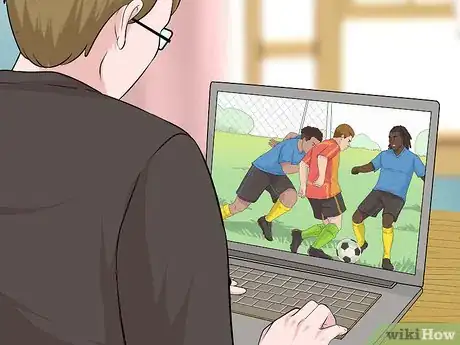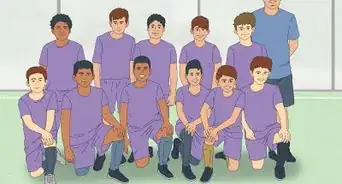This article was co-authored by Bernat Franquesa. Bernat Franquesa is the Co-Founder and Head of Methodology at APFC (Albert Puig Football Concepts), a youth development program for players and coaches with headquarters in San Diego, California. APFC provides soccer training for youth and educational content and consulting services for coaches, academies, and clubs. At APFC, Bernat is responsible for co-developing and applying technical guidelines for player development programs. He has been coaching soccer in Catalunya and the US since he was 15 years old.
There are 13 references cited in this article, which can be found at the bottom of the page.
wikiHow marks an article as reader-approved once it receives enough positive feedback. In this case, 87% of readers who voted found the article helpful, earning it our reader-approved status.
This article has been viewed 154,991 times.
Soccer is one of the most popular sports in the world. Every year, thousands of high school students compete for scholarships to play soccer at the collegiate level. Soccer scholarships are highly competitive and require athletes to play at their highest level and form relationships with college coaches.
Steps
Playing in High School
-
1Start early. By high school, you should have years of playing under your belt. Most soccer players begin playing in children’s leagues and progress through playing on school teams and for private clubs.
- It is rare that a skilled soccer player will begin playing the sport for the first time in their teenage years, but it is not impossible.
- The more that you are able to train and practice, the better you will get. Some people are naturally talented at soccer, but becoming a skilled player requires hard work.
-
2Decide whether to specialize. Many soccer athletes grew up playing other sports and continue to play on teams when soccer is not in season. You have the ability to decide whether you want to specialize in soccer (and not play other sports) or continue to be a multi-sport athlete.[1]
- There are benefits to playing other sports while seeking a soccer scholarship. Practicing and training during the soccer offseason can keep you in good physical shape and can strengthen certain skills. For example, running on the track team can be a beneficial way to strengthen your running abilities on the soccer field.
- You do run the risk of injury when you play a physical sport (like football) during the soccer offseason.
- By playing multiple sports, you may begin to feel overworked and become distracted in the scholarship process.
Advertisement -
3Play at the varsity level. When you enter high school, you will need to try out for the school’s team. Most schools will have a junior varsity and a varsity team. High school teams will host tryouts and determine which team a player will participate on. It is best to begin playing at the varsity level as early as you can. You are more attractive to recruiters and college coaches if you’ve played on the varsity team for four years rather than one or two.
- Tryouts are open to all grades and to all skill levels. As a skilled player, you need to stand out from these other players to be selected.
- Varsity level soccer teams can vary greatly in their skill levels and competitiveness. Your high school may not have a very strong soccer program or they may be well known as a competitive team.
- It is easier to standout if you are on a less competitive team, but you are less likely to be noticed by recruiters if you do not play for a well-known and competitive high school.
-
4Play at the junior varsity level. If you go through tryouts and are selected for the junior varsity team, you can still be a competitive recruit for a soccer scholarship. Use this as an opportunity build a relationship with your coach and to fine tune your skills.
- Junior varsity players have room to grow and develop their skills before they are ready to play at the varsity level.
- Play at your best level on the junior varsity team to improve your chances of making the varsity team the next year.
-
5Play for private clubs. Club soccer leagues are available in most areas. They give athletes an opportunity to play soccer competitively during the offseason when they do not play for a school team.[2]
- Club soccer is a good way to increase your visibility to recruiters, especially if your high school team is not very competitive.
- Club soccer coaches often have connections to college coaches, just as your high school coach would. Use them as a resource to make connections with college coaches and to get your name out.
Determining What Collegiate Level is Right for You
-
1Decide what type of college experience you want to have. Playing a sport in college is a big commitment. At top ranked schools, you will be playing and practicing nearly every day of the week. While in season, you will be traveling and missing classes for games.
- The majority of soccer teams are regulated under the National Collegiate Athletic Association (NCAA), which has three divisions. Only Division I and Division II schools are eligible to offer athletic scholarships; you can narrow your search to these schools.[3]
- Players on Division III teams can earn academic and merit scholarships, but these will not constitute soccer scholarships.
-
2Set appropriate goals. This takes self-reflection and being honest with yourself about your abilities. Playing for a top ranked college is not going to be feasible if your soccer skills are not at an exceptionally high level. Playing soccer at a college level is a huge commitment and if you are not 100% committed to playing, you will not succeed.
- Setting goals that are appropriate to your skill level can save you from heartache and disappointment down the line.
- Within Division I and Division II schools, colleges vary on their competitiveness. Look at the current college soccer rankings to identify schools that are more competitive than others.[4]
-
3Set academic goals. Even though you want to play soccer for this college, you are also there to get an education. The colleges that you apply to should fit your academic goals and be a good fit for you outside of soccer.
- Again, these goals should be realistic and reflective of your academic abilities. Colleges set academic requirements for their athletes and if you fall below this grade point average you can be suspended from the team. If you are an exceptional student, you will have more opportunities available.
-
4Talk to your coaches. Talk with your high school and club coach about your skill level, your potential to win a scholarship, and where you can improve. Be candid and open with your coaches about your goals to win a scholarship and ask for their help.
- Your coaches will most likely have established relationships with some colleges and recruiters. The number of contacts that your coach will have can vary widely, but they can get your foot in the door.
- Ask them what skills and areas you can improve on. Even the best soccer player can fine tune their skills and improve their consistency. Your coaches can help you identify the areas you are weak in so you can improve before playing in front of recruiters.
-
5Talk to other players. Talk to other players that you know who have gone through this process and players that are now collegiate athletes. Ask them about their experiences and for advice on the process. Consider asking them questions like:
- What has your experience playing soccer in college been like?
- What were the most challenging parts of the recruiting process?
- What do you wish you had known about the process before you had started it?
-
6Look at team rankings. Men and women’s teams are ranked based off of their win-loss record and performance in tournaments. If you want to focus your search to the most competitive schools, you should aim to be recruited by schools that are in the top 25 of the nation.[5]
- Men’s and women’s teams are ranked separately. You may find that some schools have stronger men’s programs than women’s or vice versa.[6]
-
7Make a list of schools. Based on your goals, your coaches’ input, and your skill level, you can begin to identify schools that you are most interested in. This list of schools should include the name of the soccer coach and their contact information. Most schools will have a website devoted to their athletic program where you can find this information.
- Your list of schools should be large in the beginning of your process and become narrowed down over time.[7]
Ensuring Your Eligibility
-
1Meet academic scholarship requirements. You must meet certain academic requirements to win a soccer scholarship. Once you are in college, you will need to continue to meet these requirements to maintain the scholarship.[8]
- The grade point average requirements for a soccer scholarship depend on the school. For example, an Ivy League school will have higher score requirements than most other schools.
- Even as a star recruit, if you do not meet the academic standards set by the school you will not be eligible for a scholarship.
-
2Meet the college's academic requirements. Now that you have a list of schools that you are interested in being recruited by, you will need to make sure that you are a strong applicant to the school. Like all college applicants, potential student athletes are required to meet the standards that the school has set for their admitted students. These will most likely include a threshold for your grade point average, your scores on standardized tests, strong recommendation letters, and application essays.
- Most universities include this information on their websites. Look for admitted student profiles and statistics about the academic scores of their most recent students. A guidance counselor at your high school can also help you find this information.
-
3Hire a tutor, if needed. If your grades or standardized test scores do not meet the eligibility requirements for a soccer scholarship, you need to raise your grade point average. A tutor can help you target areas that you struggle with and give one on one support.
- A writing tutor can help you to strengthen your application essays and personal statements.
- If you are struggling in a particular class or subject, ask your teacher for additional help.
-
4Be mindful of social media. Social media has changed the way that high school students are accepted to college and how athletes are recruited. Keep your social media profiles private but be aware that you may be found through your friend’s profiles.
- Never post content on your social media that can be interpreted as discriminatory. As a college athlete, you will represent your university. Universities do not want to recruit young athletes who could jeopardize the school’s reputation. This can disqualify you as a recruitment candidate.
-
5Make good choices. During the recruiting process, you will be evaluated as a person and not just as an athlete. Coaches want to know that you are able to fit in on a team and that you follow the law.
- Do not drink alcohol underage. Never post pictures or content on your social media profiles that suggest that you are drinking alcohol underage.
- Do not use any illegal drugs. Beyond risking criminal conviction, you may be drug tested before a college will finalize your soccer scholarship.
Standing Out to College Coaches
-
1Make a video. A highlight video or a video that showcases your quality skills can help you stand out among other applicants. If your club or high school films your games, reach out to your coaches for access to these videos. If they do not, you will need to invest in a quality camera and have a friend or family member film you. The film should include your game highlights and some of your best plays. You can also include footage of yourself showcasing your skills during practice or alone.[9]
- Keep the video relatively short. As a general rule, they should be less than ten minutes. If a coach wants to see more film, they will ask you for it.
- Put this video online and attach a link to the video in your resume.
-
2Make a recruiting profile. There are a number of websites, like BeRecruited and Top Drawer Soccer, that are dedicated to high school recruitment for NCAA sports. You can make a profile on these sites to increase your exposure. These profiles include your soccer stats, high school, height, weight, and soccer awards.
- Recruiters may look at these profiles to get a general understanding of your skill level based on your statistics and rewards.
- This should be done as a complimentary part of your recruiting process and cannot replace directly contacting coaches.
-
3Reach out to coaches. Check with your current coach to see if they have contacts with any of the schools on your list. Send an introductory email or letter to coaches of teams that you are interested in.
- Your introductory email or letter should include your name, high school, graduation year, and contact information. Let the coach know that you are interested in playing for their team and why you think you would be a good fit on the team.
- You should include a professional resume that contains detailed statistics from your past seasons of club and high school play. Include a copy of your high school transcript and standardized test scores as well. Be sure to include a link to the highlight reel that you have filmed.
-
4Follow up. Respond to every coach that responds to your initial email. These early stages of correspondence are very important in establishing a relationship with the coach.
- If you do not hear from a coach after two weeks, reach out to them again.
- Never ignore an email or phone call from a coach, regardless of whether you are interested in the school or not. You never know how the recruiting process will go and you will want to maintain positive relationships with different teams.
-
5Do your research. Coaches receive hundreds, or thousands, of letters from high school players who want to play at the college level. If a coach is interested, they may contact your club or high school coach to act as an intermediary. To show them that you are interested in their team, you should be familiar with the school and the team history.[10]
- During your correspondence with coaches, show that you are familiar with the team and that you are interested in attending that college for a reason.
-
6Attend showcase camps. Colleges often host developmental or showcase athletic camps to attract top-level players from across the country. Recruiters will be attending these camps and will also use this as an opportunity to assess players’ skills. These camps are predominantly offered in the summer and soccer offseason.
- Be friendly with the other people at the camp. While you all may be competing for the same scholarships, you want to demonstrate that you are a team player and someone who can get along with teammates.
-
7Play at your highest level. You will attract attention from recruiters when you are succeeding on the field. Play at your highest level in your varsity and club games and become a standout player on your team. Treat every practice and game seriously as a way to improve your skills and your chances of being recruited. Play the best game that you can every time and play as if the coach from your top choice school was watching you.
- Keep track of your record, your statistics, and any awards that you win.
- Update college coaches if you have a significant accomplishment they would be interested in, like your varsity team winning your state league.[11]
Moving Through the Recruiting Process
-
1Make it through preliminary evaluations. Once a coach has identified potential recruits, they begin reviewing these athletes more closely. They will verify your highlight reel and your statistics with your club and high school coaches. They will also verify your high school transcript with your school.
- At this stage it is important to have all of your information organized. Coaches want to see that potential recruits are taking this process seriously and are able to follow up with them with the information that they request.
-
2Have secondary evaluations. This is the stage where coaches or the recruiters they work with will come to watch you play. They may invite you on official or unofficial visits of the university and contact your family members.[12]
- Coaches want to see that you are an upstanding young person who is responsible, a team player, committed to soccer, and interested in their university.
- During this time, you will need to spend time visiting the schools and meeting other players on the team. Continue to build your relationship with the college coach and emphasize that you are very interested in playing for them.
-
3Receive offers. Coaches that are interested in offering you a scholarship at this stage will extend verbal or formal written commitments. Depending on the school, you may receive this offer through your high school or club coach. You may have room to negotiate the terms of the offer but you should review them carefully.
- Read over each offer very carefully with your parents and coaches. There may be terms for the offer, like maintaining a certain grade point average or participating in a training camp before school starts, that you have to understand and follow.
-
4Negotiate your offer, if possible. Unless you are a top recruit at one of the best Division I schools, you will probably be unable to negotiate any offer you receive. If there are some specific terms that you can negotiate, proceed cautiously. Teams have been known to pull offers from athletes that they believe to be too pushy or disrespectful.
- If you receive multiple offers, you may be able to leverage one offer against another. Keep in mind that some schools will offer a scholarship for a specific amount, like $20,000 each year, or a percentage, like 50% of tuition. A coach that offers you the highest amount, even if it is not a full ride, is unlikely to up their offer when they hear that schools are offering you less money.[13]
-
5Accept your offer. Congratulations! You’ve received a soccer scholarship from a team that you’re interested in. At this point, you will sign with the university and accept their soccer scholarship. This is essentially a contract between you and the college agreeing that you will play on their soccer team when you enroll in the school.
Expert Q&A
-
QuestionIs it easy to get a soccer scholarship?
 Bernat FranquesaBernat Franquesa is the Co-Founder and Head of Methodology at APFC (Albert Puig Football Concepts), a youth development program for players and coaches with headquarters in San Diego, California. APFC provides soccer training for youth and educational content and consulting services for coaches, academies, and clubs. At APFC, Bernat is responsible for co-developing and applying technical guidelines for player development programs. He has been coaching soccer in Catalunya and the US since he was 15 years old.
Bernat FranquesaBernat Franquesa is the Co-Founder and Head of Methodology at APFC (Albert Puig Football Concepts), a youth development program for players and coaches with headquarters in San Diego, California. APFC provides soccer training for youth and educational content and consulting services for coaches, academies, and clubs. At APFC, Bernat is responsible for co-developing and applying technical guidelines for player development programs. He has been coaching soccer in Catalunya and the US since he was 15 years old.
Licensed Soccer Coach & Head of Methodology at APFC It requires a lot of hard work. Talent and physicality are important when it comes to getting a scholarship, but make sure you also develop your brain and learn the concepts of the game so you can be a creative player, which will help you stand out.
It requires a lot of hard work. Talent and physicality are important when it comes to getting a scholarship, but make sure you also develop your brain and learn the concepts of the game so you can be a creative player, which will help you stand out. -
QuestionHow do you find a good local college to receive a soccer scholarship?
 Community AnswerIf you want to limit your college search to a specific region, use the NCAA website to exclude colleges based on their conferences. You can limit your search to colleges that are within a specific geographic area as well.
Community AnswerIf you want to limit your college search to a specific region, use the NCAA website to exclude colleges based on their conferences. You can limit your search to colleges that are within a specific geographic area as well. -
QuestionI'm 11 and I really want to get a soccer scholarship in high school. Do you think I will get a scholarship if I keep playing soccer?
 Community AnswerYes. You can get a scholarship. Just keep playing and improving. At your age you should be doing training drills more than playing matches. Matches are good but when you get older you will regret that you never trained enough. Practice makes perfect so keep training hard and you will achieve your goals.
Community AnswerYes. You can get a scholarship. Just keep playing and improving. At your age you should be doing training drills more than playing matches. Matches are good but when you get older you will regret that you never trained enough. Practice makes perfect so keep training hard and you will achieve your goals.
Warnings
- Be cautious about paying recruiting agencies or purchasing recruiting books. Always research and learn the legitimacy of these places, or you may be scammed.⧼thumbs_response⧽
References
- ↑ http://sportsscientists.com/2011/04/early-vs-late-specialization-when-should-children-specialize-in-sport/
- ↑ http://www.massclubsoccer.com/club-soccer-reasons/
- ↑ http://www.scholarshipstats.com/soccer.html
- ↑ http://www.collegescholarships.org/scholarships/sports/soccer.htm
- ↑ http://www.ncaa.com/rankings/soccer-women/d1
- ↑ http://www.ncaa.com/rankings/soccer-men/d1
- ↑ http://www.athleticscholarships.net/how-to-get-recruited-scholarship.htm
- ↑ https://bigfuture.collegeboard.org/find-colleges/campus-life/playing-sports-in-college-your-options
- ↑ http://www.athleticscholarships.net/2012/01/09/recruiting-highlight-video.htm
- ↑ http://www.athleticscholarships.net/how-to-email-college-coaches.htm
- ↑ http://www.usnews.com/education/blogs/the-scholarship-coach/2011/03/03/4-tips-before-you-pursue-athletic-scholarships
- ↑ http://www.athleticscholarships.net/how-to-get-recruited-scholarship/steps-of-the-college-recruiting-process.htm
- ↑ http://www.athleticscholarships.net/2014/11/26/how-to-negotiate-a-better-athletic-scholarship-offer.htm
About This Article
To get a soccer scholarship, try out for your school's soccer team or a club soccer league as early as possible so you improve as a player and get noticed by recruiters. Try your best to get on your school's varsity soccer team, but don't give up if you only make junior varsity. Whether you're on a school team or in a club league, tell your coaches you're interested in a soccer scholarship so they can work with you and introduce you to recruiters. Also, make sure you keep up with your school work since you'll need good grades to get a scholarship. To learn how to stand out to college coaches, scroll down!
























































































